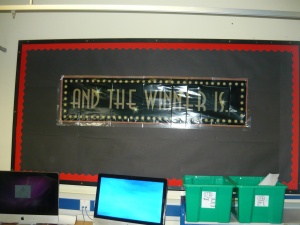Creating Instructional Videos: Difference between revisions
ChrisBailey (talk | contribs) (Created page with "{{ResourcePageGroupMenu|DEFT}} {{Rinfo |title=Creating Instructional Videos |tagline=Children create instructional videos to upload to YouTube |image=DinningtonComp.jpg |topic...") |
m (subjects, ages, types) |
||
| (8 intermediate revisions by 3 users not shown) | |||
| Line 1: | Line 1: | ||
{{ResourcePageGroupMenu|DEFT}} | {{ResourcePageGroupMenu|DEFT}} | ||
{{Rinfo | {{Rinfo | ||
|type= Lesson idea | |||
|attribution={{DEFT}} | |||
|title=Creating Instructional Videos | |title=Creating Instructional Videos | ||
|tagline=Children create instructional videos to upload to YouTube | |tagline=Children create instructional videos to upload to YouTube | ||
|image=DinningtonComp.jpg | |image=DinningtonComp.jpg | ||
|topic= | |topic=ICT | ||
|subject=Cross-curricular, | |subject= ICT, Cross-curricular, Literacy | ||
|resourcenumber= | |resourcenumber=TE0124 | ||
|age=KS3 | |age=KS3, Secondary | ||
|content= This lesson idea involves the use of technology to enable pupils to create their own instructional videos. These videos were given a real audience by being uploaded to YouTube as a resource for others to use. | |content= This lesson idea involves the use of technology to enable pupils to create their own instructional {{tag|video|videos}}. These videos were given a real audience, and therefore gave the children a purpose for their work, by being uploaded to YouTube as a resource for others to use. | ||
Children were first asked to select their own topic for the video. These ranged from tea-making, plum-tree planting | Children were first asked to select their own topic for the video. These ranged from tea-making, plum-tree planting and hamster-feeding to e-safety and cartwheels. They were then required to use the features of the instructional text genre to help them to create a script and story-board for their own video. The children then filmed their scenes and, finally, edited them together, adding text, voice-overs and other effects to create their final film. They used Apple Mac computers running iMovie Software.[http://www.apple.com/ilife/imovie/] | ||
At the end of the project, the films were shared with others at a Hollywood-style awards ceremony, before being uploaded to the internet. | At the end of the project, the films were shared with others at a Hollywood-style awards ceremony, before being uploaded to the internet. | ||
|Learning Objectives=To | |Learning Objectives=To create an instructional resource using digital video | ||
|additional resources= Video Cameras, laptops, video editing software | |additional resources= Video Cameras, laptops, video editing software | ||
| Line 28: | Line 31: | ||
|resources= This lesson idea comes from the [[DEFT]] case study [[21st century show and tell]]. The whole case study is available for reading and downloading here: http://www.digitalfutures.org/index.php/case-studies/schools/school-case-study-9/ | |resources= This lesson idea comes from the [[DEFT]] case study [[21st century show and tell]]. The whole case study is available for reading and downloading here: http://www.digitalfutures.org/index.php/case-studies/schools/school-case-study-9/ | ||
|final=yes | |||
}} | }} | ||
[[Category:Art]] [[Category:ICT]] [[Category:social media]] | [[Category:Art]] [[Category:ICT]] [[Category:social media]] [[Category:Tools]] | ||
Latest revision as of 15:13, 28 September 2012
- 21st century show and tell
- Creating Digital Paintings using iPads
- Creating Instructional Videos
- Creating and Using OERs to Promote Best Practice
- Digital Reporters at Camp Cardboard
- Digital video in ITE
- Exploring the intersections of digital literacy and creativity
- The use of mobile apps for digital story-telling with nursery pupils
- Using QR Codes to Engage Children with Learning
Lesson idea. This lesson idea involves the use of technology to enable pupils to create their own instructional videos(i). These videos were given a real audience, and therefore gave the children a purpose for their work, by being uploaded to YouTube as a resource for others to use.
Children were first asked to select their own topic for the video. These ranged from tea-making, plum-tree planting and hamster-feeding to e-safety and cartwheels. They were then required to use the features of the instructional text genre to help them to create a script and story-board for their own video. The children then filmed their scenes and, finally, edited them together, adding text, voice-overs and other effects to create their final film. They used Apple Mac computers running iMovie Software.[1]
At the end of the project, the films were shared with others at a Hollywood-style awards ceremony, before being uploaded to the internet.
Teaching approach. This activity is a cross-curricular(subject) activity with a literacy focus, involving a collaborative(tool) approach, giving children to opportunity to work together to produce a set of instructional resources. Children were encouraged to engage in group talk(ta) and discussion(ta) in the classroom to reflect on what they should include in their videos. The activity furthers e-skills(topic) through the use of whole class(ta) participation. It develops e-safety(topic) skills through discussion of the issues relating to posting digital content online. Children were allowed to choose their own subject for the video, although this could be set by a teacher with a specific outcome in mind, or could be tailored to cover a particular topic or subject. It could, for instance, be used to explain their mathematical thinking(ta). (edit)
| Resource details | |
| Title | Creating Instructional Videos |
| Topic | [[Topics/E-safety|E-safety]], [[Topics/ICT|ICT]], [[Topics/E-skills|E-skills]] |
| Teaching approach | [[Teaching Approaches/Group talk|Group talk]], [[Teaching Approaches/Whole class|Whole class]], [[Teaching Approaches/Mathematical thinking|Mathematical thinking]], [[Teaching Approaches/Discussion|Discussion]] |
| Learning Objectives | To create an instructional resource using digital video |
| Subject | [[Resources/Literacy|Literacy]], [[Resources/ICT|ICT]], [[Resources/Cross-curricular|Cross-curricular]] |
| Age of students / grade | [[Resources/Secondary|Secondary]], [[Resources/KS3|KS3]] |
| Additional Resources/material needed | Video Cameras, laptops, video editing software |
| Related ORBIT Wiki Resources | Case Study: 21st century show and tell |
| Files and resources to view and download | This lesson idea comes from the DEFT case study 21st century show and tell. The whole case study is available for reading and downloading here: http://www.digitalfutures.org/index.php/case-studies/schools/school-case-study-9/
|

